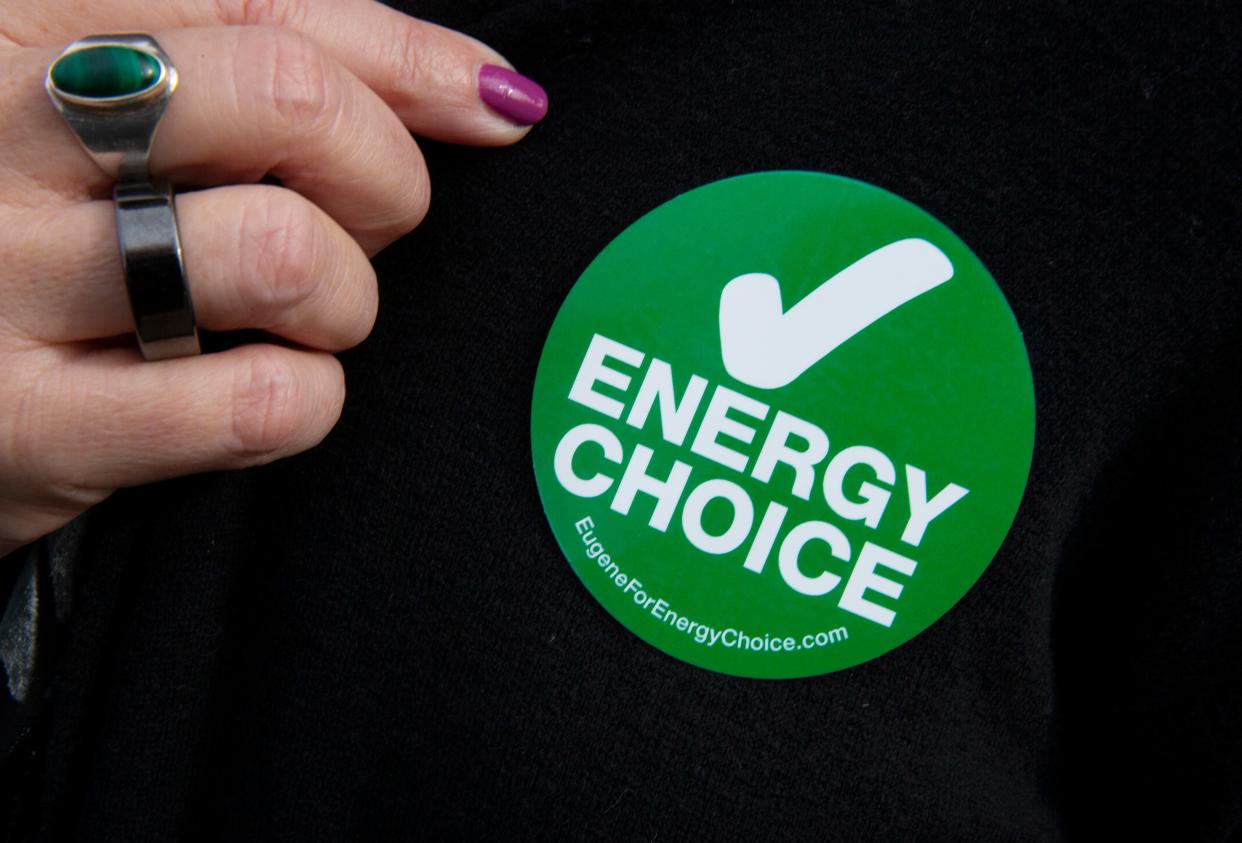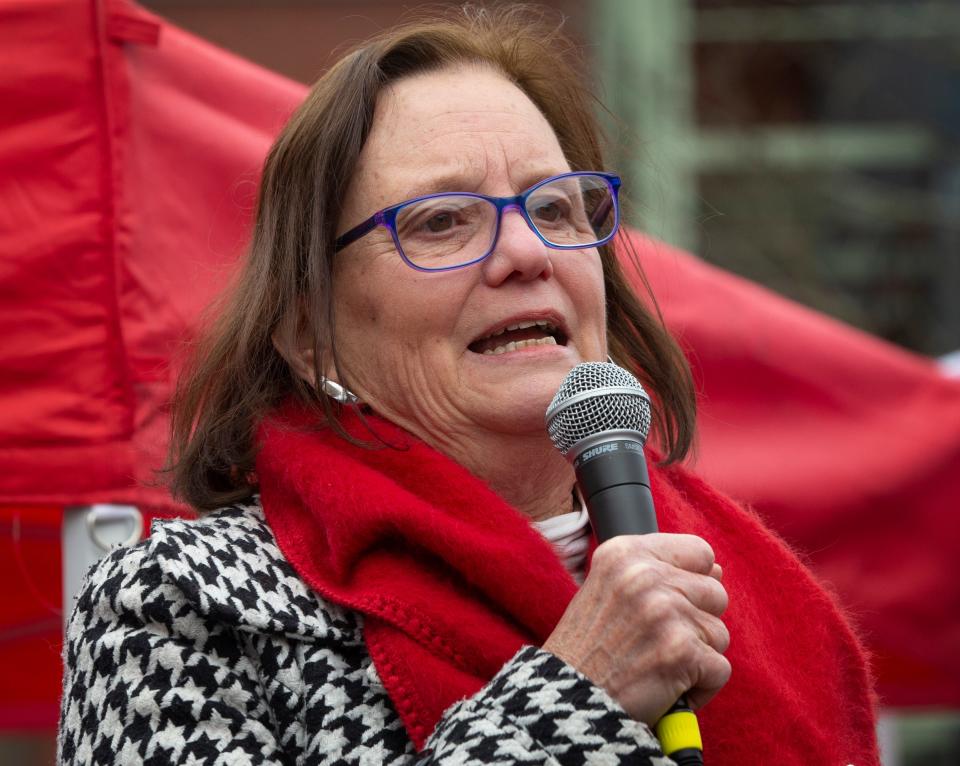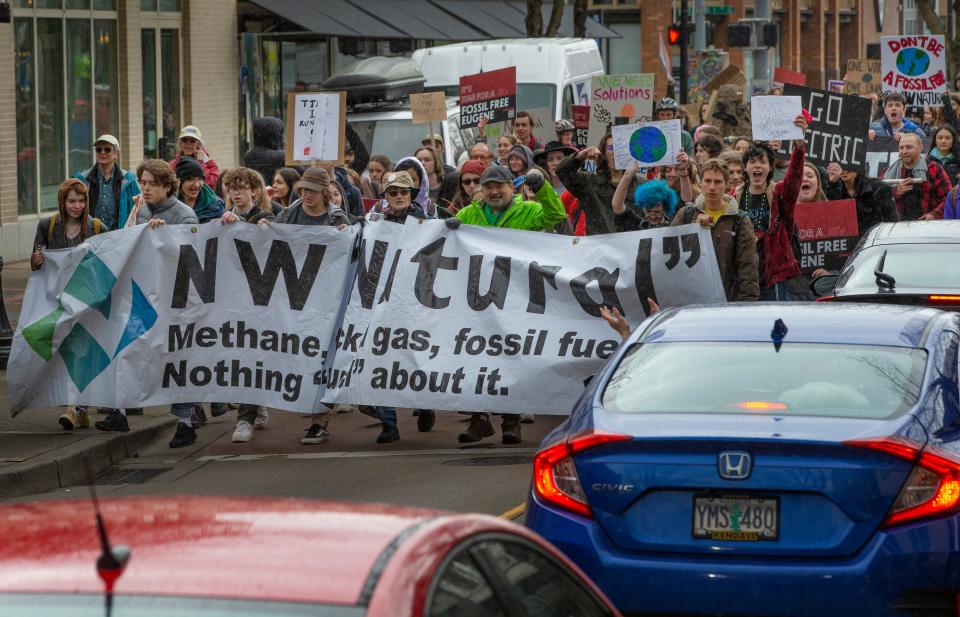Ballot measure for public vote on Eugene's natural gas ban is certified

A measure that would ban natural gas and other fossil fuel infrastructure in some new residential construction in Eugene will appear on a future ballot.
Eugene Residents for Energy Choice submitted about 12,000 signatures for a referendum petition earlier this month. The Lane County Clerk’s Office verified at least 6,460 of those matched signatures from people registered to vote within Eugene, and the recorder has certified the petition.
Those pushing for the ordinance Eugene officials passed in February to go before a public vote were “overwhelmed” with the community support, according to a press release.
Their success means the city must hold off implementing the gas ban ordinance until a public vote or scrap it altogether, if voters reject the measure. The ballot measure is likely to appear on the November ballot.
Nearly 100 cities across the country have passed similar ordinances. Eugene was the first in Oregon to do so.
Supporters of the initial ordinance have criticized the petition committee, which they claim “exists solely to do NW Natural’s bidding.” The gas utility opposed the gas ban and donated more than $900,000 in cash and services to the campaign.
David Roy, NW Natural's senior director of communications, called the claim that the committee is a front group "baffling" and said it's a separate entity the utility is supporting because "we believe Eugene voters should have a say on this decision to ban gas in new homes."
Roy added NW Natural is following state rules and guidelines and that customers are not backing the contributions.
Ordinance applies to new residential construction
The ordinance passed on Feb. 6 prohibits fossil fuel infrastructure in new low-rise residential buildings. It would have taken effect for building permits submitted on or after June 30, 2023.
It defines fossil fuel infrastructure as “natural gas piping, fuel oil piping, or other fossil fuel piping or conveyance system within a building, that connects a source of supply to a fossil-fuel burning appliance.”
Low-rise residential buildings are ones no taller than three stories with one or more permanent dwelling units, including:
Detached one- and two-family houses.
Attached, single-family dwellings (townhouses).
Manufactured homes.
Multi-family residential buildings.
The ordinance does not include mixed-used buildings where there are both retail and residential uses. It also does not include existing homes.

Measure mirrors ordinance, challenge asking for changes
The measure attached to the petition mirrors the ordinance language.
Petitioners used that wording to get 12,262 signatures and qualify the measure for a future ballot. Their success in getting the certification of enough signatures means implementation of the ordinance remains on hold.
Jim Ball, one of three listed petitioners, said the ballot measure will give Eugene voters “the opportunity for their voices to be heard.”
Though officials heard testimony on the ordinance several times through public hearings and public forums, opponents of the gas ban criticized the process and pushed for council to make it a ballot measure.
“It is good to see democracy working in our community,” Ball said in a statement.
Three Eugene residents are asking a judge to alter the ballot measure language.
Environmental, public health and social justice advocates who backed the gas ban say the ballot title the city posted based on the prospective petition is not a sufficient, concise or fair definition of the ordinance.
They’ve requested changes that add context, such as information about the Climate Recovery Ordinance, which requires the city to reduce fossil fuel consumption by 50% of 2010 levels by 2030.
Read more:Eugene voters ask judge to alter language of proposed gas ban measure
A Lane County Circuit Court judge will decide on the appeal. Oral argument related to the petition is scheduled for 9 a.m. April 4.
Activists: Committee a ‘front group’ bankrolled by NW Natural
People who supported the ordinance and the challenge to the ballot title say Eugene Residents for Energy Choice is a “front group” using contributions from NW Natural to “bankroll the collection of signatures for a ballot referendum to roll back climate change policy in a community deeply committed to the clean energy transition.”
NW Natural has donated $875,000 in cash to the campaign, according to state campaign finance records. The gas utility also has donated $79,080.38 in non-cash resources, including voter data and office supplies.
Unnamed individuals have donated $75 in miscellaneous cash contributions and $90 in non-cash resources.
The committee has spent a little more than $700,000:
$659,566.52 to I&R Campaign Management Services, based out of Newman Lake, Washington, to help organize canvassing and other efforts.
$50,095 to Funk/Levis and Associates in Eugene and Gard Communications in Portland for communications and consulting.
$1,575 to KPNW for radio advertising.
$37.75 on miscellaneous items.

Youth and other community members rallied March 3 to protest NW Natural’s efforts to roll back the ordinance, describing the ballot measure as a “direct attack on local democracy and climate justice.”
Danny Noonan, a climate and energy strategist, said the “eye-watering amount of money flowing into this campaign in such a short time from a single fossil fuel company” makes it clear the group is a front for NW Natural’s desire to overturn the council vote.
Noonan works for Breach Collective, a local climate justice advocacy group, and lives in the Whiteaker.
Lottie Rohde, a Churchill student and climate strike organizer, expressed frustration that NW Natural is working to “undo the years of work” she and other young people have invested in fighting for climate action.
Environmental activists say NW Natural has spent “significant resources trying to undermine and delay climate action policy in Eugene and across its distribution area in Oregon and Washington,” including:
Downplaying peer-reviewed science linking indoor combustion to asthma and other health issues.
Spending thousands of dollars to create children’s workbooks to distribute to Oregon schools.
Sponsoring a teacher training, which was canceled after students planned a protest.
Hiring an industry scientist to cast doubt on scientific evidence that gas stoves pose a health risk.
Paying a campaign services company to attend a public hearing on the gas ban in November 2022.
Dylan Plummer, a senior campaign representative for the Sierra Club who lives in the Amazon neighborhood, said NW Natural can no longer do anything that would surprise him.
The gas utility has shown it is “willing to do everything in its power … to keep Oregon hooked on polluting fossil fuels,” Plummer said.
Contact city government watchdog Megan Banta at mbanta@registerguard.com Follow her on Twitter @MeganBanta_1.
This article originally appeared on Register-Guard: Eugene's ban on natural gas in new homes qualifies for ballot

